Tunisia attack: Queen offers condolences to victims' families
- Published
"A picture postcard landscape has changed forever", the BBC's Orla Guerin on tales of terror and tragedy
The Queen has sent her "sincere condolences" to the families of those killed in the Tunisian beach massacre.
Officials fear the UK death toll from Friday's gun attack, which killed 38, is likely to be in the mid to high 20s.
Relatives of others still missing are anxiously awaiting any news.
Scotland Yard says its investigation into the attack is likely to be one of the largest counter-terrorism deployments since the London 7/7 bombings in 2005, which killed 52.
The Queen said she and the Duke of Edinburgh were "shocked" by the attack and also offered their "deepest sympathy" to the injured.
Other countries affected by the shooting carried out by 23-year-old Seifeddine Rezgui, who had links with Islamic State, include Belgium, Germany and Ukraine. Three people from Ireland were also killed.
Rezgui's father, who had been detained for questioning, told ITV News he was "ashamed" of his son's actions and wished "it had never happened".

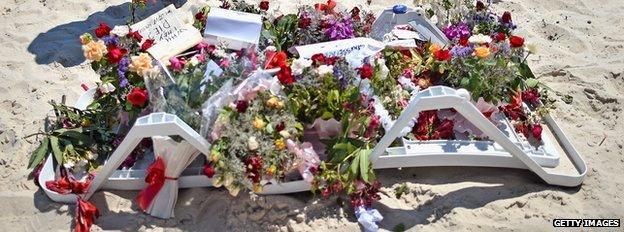
At the scene: Mark Lowen, BBC News, Sousse
There's little trace of the horror - just a sunbed draped in flowers.
The beach where Seifeddine Rezgui stood on Friday, pulled a Kalashnikov from his parasol and unleashed Tunisia's worst ever terror attack, has already reopened.
Camera crews capture the spot; passers-by pause for a moment. But the emotional scars of the tragedy that took place will live on for a generation.

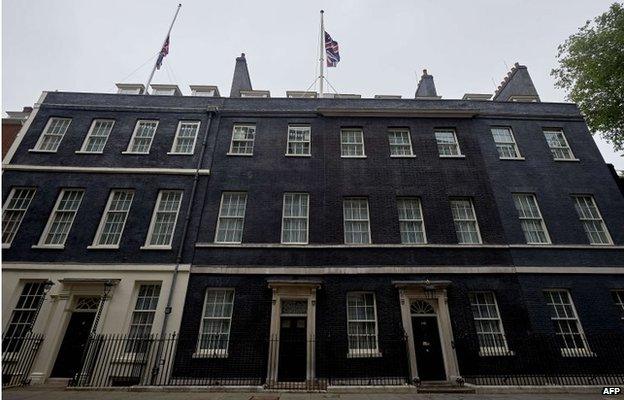
Downing Street's flags are flying at half-mast in memory of the British victims
Fifteen British deaths have been confirmed but the victims have not been officially identified. However, the names of some have been confirmed by friends and family:
Carly Lovett, 24, a beauty blogger and photographer from Gainsborough in Lincolnshire, who was first to be named
Sue Davey and her partner Scott Chalkley, both in their 40s, whose deaths were confirmed by their respective sons
Adrian Evans, his father, 78-year-old Patrick Evans and nephew Joel Richards, 19, from Wednesbury.
Bruce Wilkinson, 72, from Goole in Yorkshire.
Lisa Burbidge, in her 60s, from Whickham, Gateshead
Claire Windass, 54, from Hull, was on the beach with her husband, who survived
Prayers have been said for Jim and Ann McQuire, from Cumbernauld
Trudy Jones, 52, from Blackwood, Caerphilly county.
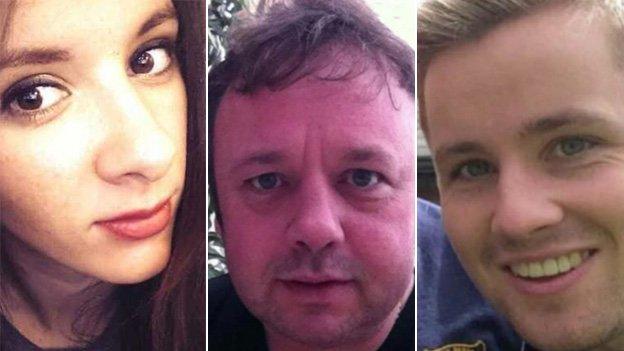
Carly Lovett, Adrian Evans and Joel Richards, left to right
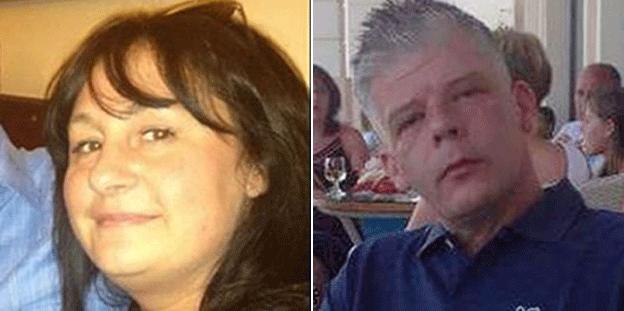
Sue Davey and Scott Chalkley

We are seeking your stories relating to the Tunisia attacks. If you or anyone you know has been affected please contact us in the following ways.
Please include a contact number if you are willing to speak to a BBC journalist.
Whatsapp: +44 7525 900971
Tweet: @BBC_HaveYourSay, external
Send an SMS or MMS to 61124

'Stringent regulations'
Several relatives have expressed concern about the lack of information from both the government and tour operators.
Holly Graham, from Perth, whose parents Billy and Lisa are missing, said: "Thomson are like they're just reading off a piece of paper. Foreign Office - they just tell you they've got no information."
The BBC has been told that identification is taking a long time because of stringent Tunisian regulations.
A senior government source says the coroner requires medical or dental records to complete the formal identification process.
The source said this was not a criticism of the Tunisian authorities but helped explain why the process appeared to be taking longer than may have been expected.
Daniel Welch, from Swindon in Wiltshire, says he is at a "bit of a loss" about his grandfather John Welch, 74, and his partner Eileen Swannack, 70.
He said the hardest thing was "not knowing".
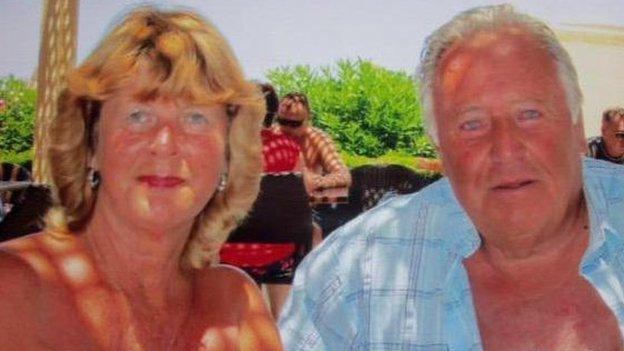
John Welch and his partner Eileen Swannack
The family of Denis and Elaine Thwaites, from Blackpool, Lancashire, are appealing for information about their whereabouts.
The retired couple, aged 70 and 69, arrived in Sousse on Wednesday and had been staying at the Marhaba.
Their son-in-law Danny Clifford said news the family had received telling them Mr and Mrs Thwaites were in hospital was proved to be misinformation. "We are absolutely frantic," he added.
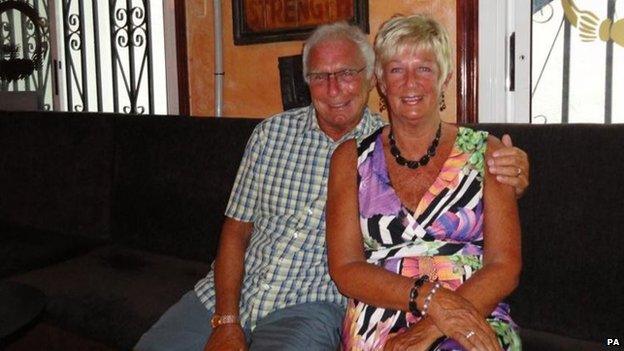
Denis and Elaine Thwaites
The Met said its operation currently involves more than 600 officers and staff, with many sent to British airports to speak to returning holidaymakers. It has sent 16 officers to Tunisia, including forensic specialists and family liaison officers.
The Foreign Office has sent 28 experts to provide support on the ground in Tunisia.
Speaking after she chaired a meeting of the government's emergency Cobra committee, Home Secretary Theresa May said Foreign Office staff were working round the clock in Tunisia and a 24-hour crisis centre was up and running in the UK.
Footage appears to show the gunman running along the shoreline after the Tunisia beach attack
She added that she had seen no evidence to indicate the beach was targeted because of the high number of British holidaymakers.
Holiday firms have put on extra flights on top of scheduled services for people wanting to return home. Flights to the North African country have also been cancelled.
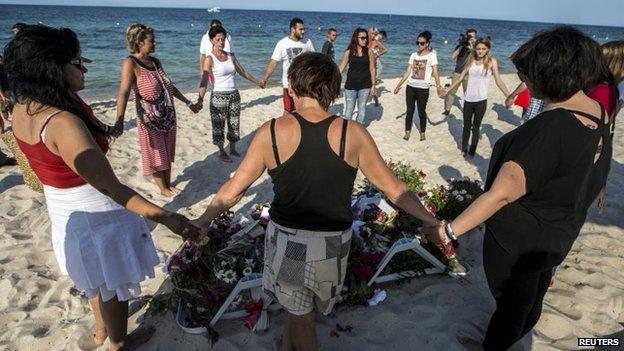
Tourists and local people gathered on the beach to say prayers
Thomas Cook said 1,100 people who cut short their stay in the country were among 3,600 who have flown back since the attack. It laid on two extra flights on Saturday and one on Sunday.
Thomson had 12 flights out of Tunisia on Sunday, external to bring people home at the end of their holiday and repatriate others who wished to return home straightaway.
Jet2holidays and Jet2.com said they had sent three 235-seat aircraft, external to Tunisia on Saturday. Two returned to the UK the same night with 313 customers on board. The third is on standby at Tunisia's Enfidha Airport.
The beach area at Sousse where the attack took place has now reopened.
Rezgui, a Tunisian student who was not previously known to the authorities, began his attack on tourists at noon on Friday. He had been posing as a swimmer but carrying a rifle under a parasol.
He shot at people on the beach near the Imperial Marhaba and Bellevue hotels. He then entered one of the hotel lobbies, where explosives were also detonated.
The video from Facebook has been confirmed as Tunisia gunman Seifeddine Rezgui
He then walked through the streets of Sousse where he was reportedly chased by local Tunisians, firing shots at them.
It has also been reported that local builders threw rubble down at him from rooftops as he passed by in the street. The attack eventually ended when he was shot dead by police.
Mohammed Ali Aroui, a spokesman for Tunisia's Interior Ministry, told the AP news agency that investigators were "sure" Rezgui had help.
An eyewitness told the BBC's Mark Lowen that Rezgui appeared to make a phone call before throwing his mobile into the sea and beginning his killing spree.
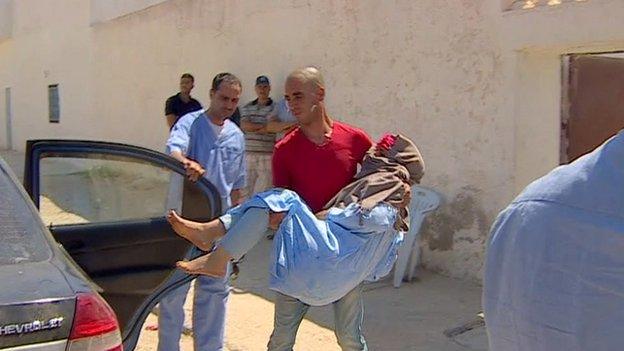
Rezgui's mother was taken to hospital from her home in the Tunisian village of Jaafour
BBC home affairs correspondent Daniel Sandford said it appeared Rezgui had joined a group of increasingly radicalised students while at university in Kairouan.
"Tunisian police believe he was helped in the build-up to the attack - someone supplied the weapon, someone gave him transport."
Rezgui's father told ITV News: "My god, I am so shocked. I don't know who has contacted him, influenced him or who has put these ideas in his head.
"I had no idea and I am really sorry. I feel like I have died along with the victims."
His mother, who had also been detained by the police, was pictured by a BBC film crew being taken to hospital in a state of shock.
The Foreign Office has updated its travel advice, external to warn that further terrorist attacks in Tunisia are possible, and urged people to be vigilant.
The beach massacre is the second attack on tourists in Tunisia in three months. In March, gunmen killed 21 tourists and a Tunisian when they stormed a museum in the capital Tunis.


Were you in Sousse in Tunisia when the attacks happened? Do you have friends or family affected? Please share your stories.
You can share your experiences by emailing haveyoursay@bbc.co.uk, external. If you are happy to speak to a BBC journalist, please leave a contact number.
Or WhatsApp us on+44 7525 900971.